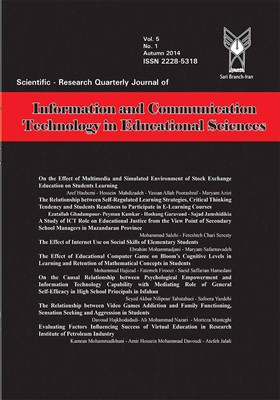A Study of ICT Role on Educational Justice from the View Point of Secondary School Managers in Mazandaran Province
Subject Areas : Infomartion Technology
Mohammad Salehi
1
![]() ,
Fereshteh Chari Sarasty
2
,
Fereshteh Chari Sarasty
2
1 - Associate Professor of Islamic Azad University, Sari Branch, Sari, Iran
2 - M.A. in Educational Management, Islamic Azad University, Sari Branch, Sari, Iran
Keywords: Information and communication technology, educational justice, individual learning, environmental learning,
Abstract :
This research was conducted aiming to study the ICT role on educational justice from the view point of secondary school managers in Mazandaran province. The research method was descriptive survey. Statistical population was all secondary school managers of Mazandaran province. Based on Krejcie and Morgan, sample size determined 238 individuals (149 female and 89 male), who were selected through stratified random sampling method. Information gathering tool was educational justice questionnaire with 40 questions which were answered by the managers. The questionnaire involved the effect of information and communication technology on educational justice in four dimensions: availability broad development, individual learning flexibility, environmental learning flexibility and feedback presentation. Content validity of the questionnaire was confirmed by specialists’ perspective, and the reliability, using Chronbach's Alpha Coefficient, was calculated 0.82. The collected data was analyzed using one sample t test. The research results showed that ICT was influential on educational justice via availability broad development, individual learning flexibility, environmental learning flexibility and immediate feedback presentation.


